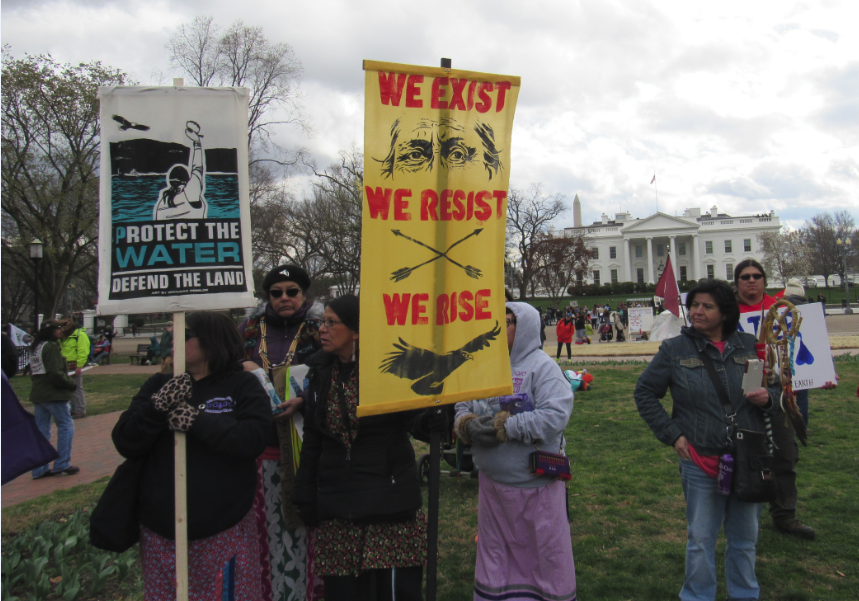
- Details
- By Native News Online Staff
WASHINGTON — A request for injunction was filed in Federal District Court of the District of Columbia last week by Earthjustice on behalf of the Standing Rock Sioux Tribe as an effort to shut down the Dakota Access pipeline.
The brief was filed to have U.S. District Judge James Boasberg clarify his ruling from July 6 that ordered Energy Transfer, the company behind the Dakota Access pipeline, to shut down the flow of oil on Aug. 6. That ruling was overturned by a three-judge panel of the U.S. Court of Appeals for the District of Columbia
“The Tribes are irreparably harmed by the ongoing operation of the pipeline, through the exposure to catastrophic risk, through the ongoing trauma of the government’s refusal to comply with the law, and through undermining the Tribes' sovereign governmental role to protect their members and respond to potential disasters,” attorneys Jan Hasselman and Nicole Ducheneaux wrote in a Friday filing.
The Dakota Access pipeline was the center of controversy four years ago when tens of thousands of American Indians and allies protested at Standing Rock. The DAPL crosses beneath the Missouri River at Lake Oahe just half a mile from the Standing Rock Indian reservation in North Dakota, on unceded ancestral lands.
In addition to the brief filed, a declaration from Jon Eagle, Tribal Historic Preservation Officer for the Standing Rock Sioux, was filed.
“My ancestors signed treaties with the United States government in the hopes that their grandchildren would have a future. And yet our experience is that the United States does not honor the treaties of their grandfathers. Does our treaty not say, ‘absolute and undisturbed use and occupation of the Indians therein named?’ How is it that a pipeline could be allowed to go through our treaty territory without our consent?” Eagle wrote in his declaration.
“I have previously discussed the historic trauma that every Tribal member carries with them. Allowing this pipeline to continue operating will compound this trauma yet again, causing untold harm,” Eagle concluded.
As the Standing Rock Sioux Tribe continues the legal process going in the court system, at home the tribe has asked the U.S. Army Corps of Engineers to extend its public comment period on the Environmental Impact Statement now underway to determine the risk the Dakota Access pipeline poses to Standing Rock tribal citizens. Covid-19 was cited as the reason for the extension request.
“We demand a true consultation here at Standing Rock. The proposed scoping does not address our concerns, which are essential to a complete, accurate and fair assessment of the risks the pipeline poses to Standing Rock, including the public’s health and the local environment,” the tribe said in a press release.
The Dakota Access pipeline was fast-tracked by the Trump administration because of a presidential memorandum signed by President Donald Trump four days after he assumed the presidency. The Obama administration said a month before it would not grant a permit for the pipeline.
More Stories Like This
Native News Weekly (August 25, 2024): D.C. BriefsMonday Morning: (February 16, 2026): Articles You May Have Missed This Past Weekend
US Presidents in Their Own Words Concerning American Indians
Osage Nation Mourns the Passing of Former Principal Chief Jim Gray
Native News Weekly (February 15, 2026): D.C. Briefs
Help us defend tribal sovereignty.
At Native News Online, our mission is rooted in telling the stories that strengthen sovereignty and uplift Indigenous voices — not just at year’s end, but every single day.
Because of your generosity last year, we were able to keep our reporters on the ground in tribal communities, at national gatherings and in the halls of Congress — covering the issues that matter most to Indian Country: sovereignty, culture, education, health and economic opportunity.
That support sustained us through a tough year in 2025. Now, as we look to the year ahead, we need your help right now to ensure warrior journalism remains strong — reporting that defends tribal sovereignty, amplifies Native truth, and holds power accountable.
 The stakes couldn't be higher. Your support keeps Native voices heard, Native stories told and Native sovereignty defended.
The stakes couldn't be higher. Your support keeps Native voices heard, Native stories told and Native sovereignty defended.
Stand with Warrior Journalism today.
Levi Rickert (Potawatomi), Editor & Publisher

